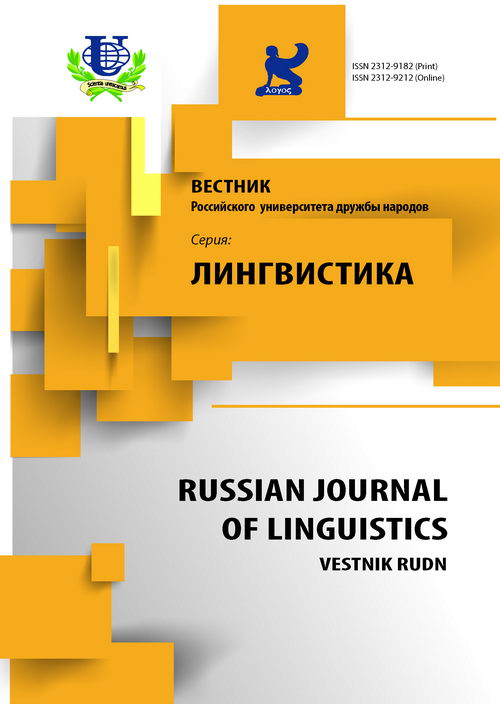№ 4 (2012)
- Год: 2012
- Статей: 15
- URL: https://journals.rudn.ru/linguistics/issue/view/579
Статьи
Лингвокогнитивная типология символов
Аннотация
В статье рассматриваются разные типы референции символа в речи. Означающее символа — языковая единица — в разной степени отражает объем денотата. Три типа символов обусловлены степенью охвата и проясненности денотата: символ-понятие (отражена только одна реалия действительности), символ-ситуация (целая денотативная ситуация) и символический сюжет (цепь денотативных ситуаций). Разделение языковых вариантов символа на три типа позволяет сформировать представление о масштабе символизации в тексте и ее текстообразующей роли.
Russian Journal of Linguistics. 2012;(4):5-13
 5-13
5-13


Проблема номинации и обозначения в языке и речи: сопоставительный аспект
Аннотация
Между значением языкового знака как средства номинации и значением речевого знака как средства обозначения существует определенная связь. Она заключается в возможности использования языкового знака для речевого обозначения референта и основывается на совпадении сигнификативных и десигнативных признаков.
Russian Journal of Linguistics. 2012;(4):14-19
 14-19
14-19


 20-23
20-23


 24-32
24-32


 33-39
33-39


Особенности английского иронического дискурса
Аннотация
В статье речь идет об иронии как категории дискурса и функциях иронии в английской лингвокультуре. Выделяется гиперстратегия английской иронии — оптимизация межличностных отношений, ставится вопрос о включении иронии в число стратегий вежливости.
Russian Journal of Linguistics. 2012;(4):40-47
 40-47
40-47


О роли стилистико-синтаксических приемов экспансии в информационном комплексе диктемы немецкоязычного рекламного текста
Аннотация
В статье рассматриваются стилистико-синтаксические приемы экспансии, которые выступают композиционным средством, варьируют нормативную синтаксическую структуру рекламного текста, участвуют в формировании его смысла, создавая условия для реализации интенции рекламодателя. С помощью данных языковых элементов-носителей, выражающих инвариантный тактический смысл, рекламодатель сознательно расширяет и/или усложняет информационный комплекс диктемы, воздействующей единицы рекламного текста, транслируя наряду с фактуальной избыточную импрессивную информацию. Сочетание фактуальной и импрессивной рубрики информации активизирует как рациональный, так и эмоциональный канал восприятия потенциального потребителя, интенсифицирует процесс позиционирования рекламируемого продукта.
Russian Journal of Linguistics. 2012;(4):48-57
 48-57
48-57


Семантико-стилистическое своеобразие славянизмов в языке современных газет
Аннотация
В статье рассматривается функционирование славянизмов в языке современных казахстанских и российских газет. На основе примеров, эксцерпированных из современных газет, дается информативная картина о тенденциях и закономерностях современного словоупотребления в СМИ.
Russian Journal of Linguistics. 2012;(4):58-64
 58-64
58-64


Формирование процессуальных дискурсивно-аналитических междисциплинарных и внутридисциплинарных связей в программе подготовки лингвистов
Аннотация
Статья посвящена актуализации дискурсивного анализа в преподавании профилирующих дисциплин и аспектов первого иностранного (английского) языка при обучении лингвистов. Показаны междисциплинарные и внутридисциплинарные взаимосвязи при формировании дискурсивной линии, охватывающей аспекты чтения, письма, говорения и др.
Russian Journal of Linguistics. 2012;(4):65-72
 65-72
65-72


Олицетворение как средство персонификации космического пространства в поэзии начала ХХ в
Аннотация
В статье рассматривается олицетворение как средство персонификации космического пространства в поэзии начала ХХ в. В работе представлен спектр олицетворяющихся номинаций, рассмотрены группы глаголов, выражающие олицетворяющие признаки в поэтических текстах начала ХХ в.
Russian Journal of Linguistics. 2012;(4):73-79
 73-79
73-79


 80-86
80-86


Три «молота» древнееврейского языка
Аннотация
Данная статья посвящена трем терминам библейского иврита, которые традиционно переводятся на русский язык одинаково — «молот». В рамках данного исследования мы попытаемся разграничить семантику этих лексем при помощи сравнительно-исторического метода.
Russian Journal of Linguistics. 2012;(4):87-95
 87-95
87-95


Типы полисемии в структуре лексических значений девербативов с нулевым суффиксом
Аннотация
В статье рассматриваются типы полисемии, характерные для обширного массива имен действия (nomina actionis) с нулевым суффиксом. Рассматривается роль семантики мотивирующего глагола в формировании структуры лексического значения девербативов. Устанавливаются типы полисемии, источники многозначности, закономерности формирования предметных номинаций в смысловой структуре девербативов.
Russian Journal of Linguistics. 2012;(4):96-107
 96-107
96-107


Метонимические средства выражения эмоций в речи арабов
Аннотация
В статье рассматриваются метонимические средства репрезентации категории эмотивности, связанной с этнопсихолингвистическими особенностями арабофонов, в условиях современной языковой ситуации в арабоязычном ареале. Дается описание специфики интерпретации метонимических средств и эмотивной функции языка в арабской языковедческой традиции.
Russian Journal of Linguistics. 2012;(4):108-117
 108-117
108-117


Наши авторы
Russian Journal of Linguistics. 2012;(4):118-119
 118-119
118-119
















